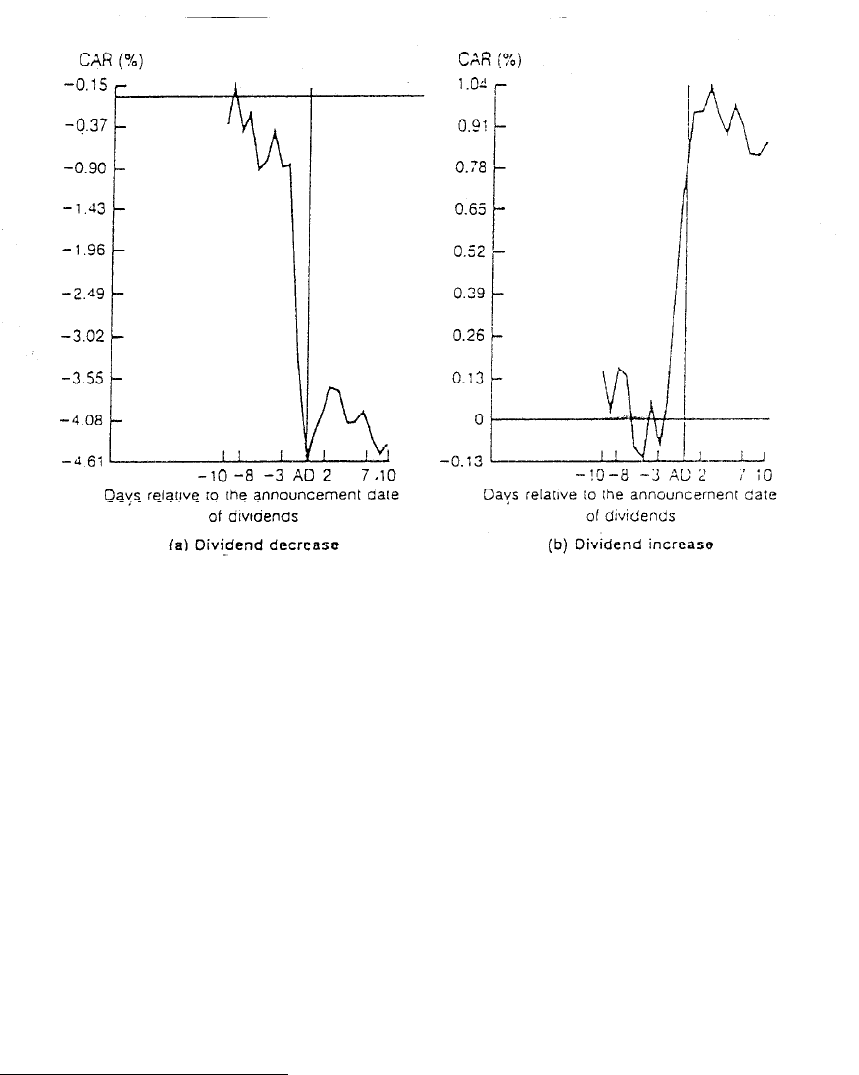Damodaran A. Applied corporate finance
Подождите немного. Документ загружается.


39
39
The empirical evidence concerning price reactions to dividend increases and
decreases is consistent, at least on average, with this signaling theory. Figure 10.15
summarizes the average excess returns around dividend changes for firms.
17
Figure 10.15: Excess Returns around Announcements of Dividend Changes
Source: Aharony and Swary
We should view this explanation for dividends increases and decreases cautiously,
however. Although it is true that firms with good projects may use dividend increases to
convey information to financial markets, given the substantial tax liability that increased
dividends create for stockholders, is it the most efficient way? For smaller firms, which
have relatively few signals available to them, the answer might be yes. For larger firms,
which have many ways of conveying information to markets, dividends might not be the
least expensive or the most effective signals. For instance, the information may be more
effectively and economically conveyed through an analyst report on the company.
There is another reason for skepticism. An equally plausible story can be told
about how an increase in dividends sends a negative signal to financial markets. Consider
17
Aharony, J. and I. Swary, 1981, Quarterly Dividends and Earnings Announcements and Stockholders'

40
40
a firm that has never paid dividends in the past but has registered extraordinary growth
and high returns on its projects. When this firm first starts paying dividends, its
stockholders may consider this an indication that the firm’s projects are neither as
plentiful nor as lucrative as they used to be. However, Palepu and Healy find that the
initiation of dividends does not signal a decline in earnings growth in a study of 151 firms
from 1970 to 1979.
18
10.9. ☞: Dividends as Signals
Silicon Electronics, a company with a history of not paying dividends, high earnings
growth and reinvestment back into the company, announces that it will be initiating
dividends. You would expect
a. the stock price to go up
b. the stock price to go down
c. the stock price to remain unchanged
Explain.
Dividend policy is a tool for changing financing mix
Dividend policy cannot be analyzed in a vacuum. Firms can use dividend policy
as a tool to change their debt ratios, In chapter 9, we examined how firms that want to
increase or decrease leverage can do so by changing their dividend policy: increasing
dividends increases leverage over time, and decreasing dividends reduces leverage.
When dividends increase, stockholders sometimes get a bonus in the form of a
wealth transfer from lenders to the firm. Lenders would rather have firms accumulate
cash than pay it out as dividends. The payment of dividends takes cash out of the firm,
and this cash could have been used to cover outstanding interest or principal payments.
Not surprisingly, bond prices decline on the announcement of large increases in
dividends. It is equity investors who gain from the loss in market value faced by
bondholders. Bondholders, of course, try to protect themselves against this loss by
restricting how much firms can pay out in dividends.
Returns: An Empirical Analysis, Journal of Finance, Vol 36, 1-12.

41
41
Dividends reduce managerial discretion/power
In examining debt policy, we noted that one reason for increasing debt levels was
to induce managers to be more disciplined in their project choice. Implicit in this free
cash flow argument is the assumption that cash accumulations, if left to the discretion of
the managers of the firm, would be wasted on poor projects. If this is true, then forcing a
firm to make a commitment to pay dividends would be an alternative to forcing managers
to be disciplined in project choice and to reducing the cash that is available for
discretionary uses. If this is the reason stockholders want managers to commit to paying
larger dividends, then in firms where there is a clear separation between ownership and
management, managers should pay larger dividends than in firms with substantial insider
ownership and involvement in managerial decisions.
Managerial Interests and Dividend Policy
We have considered dividend policy in this chapter almost entirely from the
perspective of equity investors in the firm. In reality, though, it is managers who set
dividend policy and it should come as no surprise that there may be a potential for a
conflict of interests between stockholders and managers.
The Source of the Conflict
In examining debt policy, we noted that one reason for taking on more debt was to
induce managers to be more disciplined in their project choice. Implicit in this free cash
flow argument is the assumption that cash accumulations, if left to the discretion of the
managers of the firm, would be wasted on poor projects. If this is true, we can argue that
forcing a firm to make a commitment to pay dividends provides an alternative to forcing
managers to be disciplined in project choice and to reducing the cash that is available for
discretionary uses.
If this is the reason stockholders want managers to commit to paying larger
dividends, firms in which there is a clear separation between ownership and management,
18
Palepu, K and P. Healy, 1988, Earnings Information Conveyed by Dividend Initiations and Omissions,
Journal of Financial Economics, v21, 149-175.

42
42
should pay larger dividends than should firms with substantial insider ownership and
involvement in managerial decisions.
What do managers believe about dividend policy?
Given the pros and cons for paying dividends, and the lack of a consensus on the
effect of dividends on value, it is worth considering what managers factor in when they
make dividend decisions. Baker, Farrely and Edelman (1985) surveyed managers on their
views on dividend policy and reported the level of agreement with a series of statements.
Table 10.3 summarizes their findings –
Table 10.3: Management Beliefs about Dividend Policy
Statement of Management Beliefs
Agree
No Opinion
Disagree
1. A firm's dividend payout ratio
affects the price of the stock.
61%
33%
6%
2. Dividend payments provide a
signaling device of future
prospects.
52%
41%
7%
3. The market uses divided
announcements as information for
assessing firm value.
43%
51%
6%
4. Investors have different
perceptions of the relative riskiness
of dividends and retained earnings.
56%
42%
2%
5. Investors are basically
indifferent with regard to returns
from dividends and capital gains.
6%
30%
64%
6. A stockholder is attracted to
firms that have dividend policies
appropriate to the stockholder’s tax
environment.
44%
49%
7%
7. Management should be
responsive to shareholders'
preferences regarding dividends.
41%
49%
10%
It is quite clear from this survey that, rightly or wrongly, managers believe, that their
dividend payout ratios affect firm value and operate as signals of future prospects. They
also operate under the presumption that investors choose firms with dividend policies that
match their preferences and that management should be responsive to their needs.

43
43
In an updated and comprehensive survey
19
of dividend policy published in 2004,
Brav, Graham, Harvey and Michaely conclude that management’s focus is not on the
level of dividends but on changes in these dividends. Indicating a shift from views in
prior studies, many managers in this survey saw little gain from increasing dividends
even in response to higher earnings and preferred stock buybacks instead. In fact, many
managers in companies that paid dividends indicated regret the level of dividends paid by
their firms, indicating that they would have set the dividend at a much lower level, if they
had the choice. In contrast to the survey quoted in the last paragraph, managers also
rejected the idea that dividends operate as useful financial signals, From the survey, the
authors conclude that the rules of the game for dividends are the following: do not cut
dividends, have a dividend policy similar to your peer group, preserve a good credit
rating, maintain flexibility and do not take actions that reduce earnings per share.
10.10. ☞: Corporate Governance and Dividend Policy
In countries, where stockholders have little or no control over incumbent managers, you
would expect dividends paid by companies
a. to be lower than dividends paid in other countries
b. to be higher than dividends paid in other countries
c. to be about the same as dividends paid in other countries
Conclusion
There are three schools of thought on dividend policy. The first is that dividends
are neutral, and that they neither increase nor decrease value. Stockholders therefore are
indifferent between receiving dividends and enjoying price appreciation. This view is
based upon the assumptions that there are no tax disadvantages to investors associated
with receiving dividends, relative to capital gains, and that firms can raise external capital
for new investments without issuance costs.
The second view is that dividends destroy value for stockholders, because they
are taxed at much higher rates than capital gains. The evidence for this tax disadvantage
19
Brav, A., J.R. Graham, C.R. Harvey and R. Michaely, Payout Policy in the 21
st
Century, 2004,, Working
Paper, Duke University.
44
44
is strong both in the tax code and in markets, when we examine how stock prices change
on ex-dividend days. On average, stock prices decline by less than the amount of the
dividend, suggesting that stockholders in most firms consider dividends to be less
attractive than equivalent capital gains.
The third school of thought makes the argument that dividends can be value
increasing, at least for some firms. In particular, firms that have accumulated
stockholders who prefer dividends to capital gains should continue to pay large and
increasing dividends to keep their investor clientele happy. Furthermore, increasing
dividends can operate as a positive signal to financial markets and allow a firm to change
its financing mix over time. Finally, forcing firms to pay out dividends reduces the cash
available to managers for new investments. If managers are not investing with the
objective of maximizing stockholder wealth, this can make stockholders better off.
In summary, there is some truth to all these viewpoints, and it may be possible to
develop a consensus around the points on which they agree. The reality is that dividend
policy requires a trade-off between the additional tax liability it may create for firms and
the potential signaling and free cash flow benefits of making the additional commitment
to their stockholders. In some cases, the firm may choose not to increase or initiate
dividends, because its stockholders are in high tax brackets and are particularly averse to
dividends. In other cases, dividend increases may result.
45
45
Live Case Study
The Trade Off on Dividend Policy
Objective: To examine how much cash your firm has returned to its stockholders and in
what form (dividends or stock buybacks), and to evaluate whether the trade off favors
returning more or less.
Key Questions:
• Has this firm ever paid out dividends? If yes, is there a pattern to the dividends
over time?
• Given this firm’s characteristics today, do you think that this firm should be
paying more dividends, less dividends or no dividends at all?
Framework for Analysis:
1. Historical Dividend Policy
• How much has this company paid in dividends over the last few years?
• How have these dividends related to earnings in these years?
2. Firm Characteristics
• How easily can the firm convey information to financial markets? In other
words, how necessary is it for them to use dividend policy as a signal?
• Who are the marginal stockholdera in this firm? Do they like dividends or
would they prefer stock buybacks?
• How well can this firm forecast its future financing needs? How valuable is
preserving flexibility to this firm?
• Are there any significant bond covenants that you know of that restrict the
firm’s dividend policy?
• How does this firm compare with other firms in the sector in terms of
dividend policy?
Getting Information on dividend policy
You can get information about dividends paid back over time from the financial
statements of the firm. (The statement of changes in cash flows is usually the best

46
46
source.) To find typical dividend payout ratios and yields for the sector in which this firm
operates examine the data set on industry averages on my web site.
Online sources of information:
http://www.stern.nyu.edu/~adamodar/cfin2E/project/data.htm
47
47
Problems
1. If Consolidated Power is priced at $50.00 with dividend, and its price falls to $46.50
when a dividend of $5.00 is paid, what is the implied marginal rate of personal taxes for
its stockholders? Assume that the tax on capital gains is 40% of the personal income tax.
2. You are comparing the dividend policies of three dividend-paying utilities. You have
collected the following information on the ex-dividend behavior of these firms.
NE Gas SE Bell Western Electric
Price before 50 70 100
Price after 48 67 95
Dividends/share 4 4 5
If you were a tax-exempt investor, which company would you use to make “dividend
arbitrage” profits? How would you go about doing so?
3. Southern Rail has just declared a dividend of $ 1. The average investor in Southern
Rail faces an ordinary tax rate of 50%. While the capital gains rate is also 50%, it is
believed that the investor gets the advantage of deferring this tax until future years (The
effective capital gains rate will therefore be 50% discounted back to the present). If the
price of the stock before the ex-dividend day is $10 and it drops to $9.20 by the end of
the ex-dividend day, how many years is the average investor deferring capital gains
taxes? (Assume that the opportunity cost used by the investor in evaluating future
cashflows is 10%.)
4. LMN Corporation, a real estate corporation, is planning to pay a dividend of $0.50 per
share. Most of the investors in LMN corporation are other corporations that pay 40% of
their ordinary income and 28% of their capital gains as taxes. However, they are allowed
to exempt 85% of the dividends they receive from taxes. If the shares are selling at $10
per share, how much would you expect the stock price to drop on the ex-dividend day?
5. UJ Gas is a utility that has followed a policy of increasing dividends every quarter by
5% over dividends in the prior year. The company announces that it will increase
48
48
quarterly dividends from $1.00 to $ 1.02 next quarter. What price reaction would you
expect to the announcement? Why?
6. Microsoft Corporation, which has had a history of high growth and pays no dividends,
announces that it will start paying dividends next quarter. How would you expect its
stock price to react to the announcement? Why?
7. JC Automobiles is a small auto parts manufacturing firm, which has paid $1.00 in
annual dividends each year for the last 5 years. It announces that dividends will increase
to $ 1.25 next year. What would you expect the price reaction to be? Why? If your
answer is different from the prior problem, explain the reasons for the difference.
8. Would your answer be different for the previous problem, if JC Automobiles were a
large firm followed by 35 analysts? Why or why not?
9. WeeMart Corporation, a retailer of children’s clothes, announces a cut in dividends
following a year in which both revenues and earning dropped significantly. How would
you expect its stock price to react? Explain.
10. RJR Nabisco, in response to stockholder pressure in 1996, announced a significant
increase in dividends paid to stockholders, financed by the sale of some of its assets.
What would you expect the stock price to do? Why?
11. RJR Nabsico also had $ 10 billion in bonds outstanding at the time of the dividend
increase in problem 10. How would you expect Nabisco’s bonds to react to the
announcement? Why?
12. When firms increase dividends, stock prices tend to increase. One reason given for
this price reaction is that dividends operate as a positive signal. What is the increase in
dividends signaling to markets? Will markets always believe the signal? Why or why
not?
